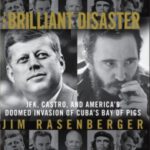 In the ongoing debate over who was responsible for the failed U.S. invasion of Cuba in 1961, Rasenberger rejects accusations that the CIA acted as an independent rogue power and instead blames Presidents Dwight Eisenhower and John F. Kennedy. But Rasenberger’s real culprit is American political culture, with its paradoxical combination of hubris and insecurity, which simply could not tolerate sharing a hemisphere with an insubordinate Cuba. He depicts the early Kennedy White House as inexperienced yet headstrong, shockingly disorganized, driven by excessive testosterone and cynical self-interest. Yet Rasenberger also puts forward the novel theory that, whether through luck or calculation, the outcome for Kennedy was fortuitous: the failed invasion disposed of the pesky Cuban exiles and avoided the high costs of an American occupation. In the aftermath, the Kennedy White House became better organized and brilliantly handled the 1962 Cuban missile crisis. Nevertheless, the author asserts, “the best and the brightest” failed to question basic precepts of American interests and power and thus repeated many of the same errors, on a much larger scale, in Vietnam.
In the ongoing debate over who was responsible for the failed U.S. invasion of Cuba in 1961, Rasenberger rejects accusations that the CIA acted as an independent rogue power and instead blames Presidents Dwight Eisenhower and John F. Kennedy. But Rasenberger’s real culprit is American political culture, with its paradoxical combination of hubris and insecurity, which simply could not tolerate sharing a hemisphere with an insubordinate Cuba. He depicts the early Kennedy White House as inexperienced yet headstrong, shockingly disorganized, driven by excessive testosterone and cynical self-interest. Yet Rasenberger also puts forward the novel theory that, whether through luck or calculation, the outcome for Kennedy was fortuitous: the failed invasion disposed of the pesky Cuban exiles and avoided the high costs of an American occupation. In the aftermath, the Kennedy White House became better organized and brilliantly handled the 1962 Cuban missile crisis. Nevertheless, the author asserts, “the best and the brightest” failed to question basic precepts of American interests and power and thus repeated many of the same errors, on a much larger scale, in Vietnam.
(Foreign Affairs)















